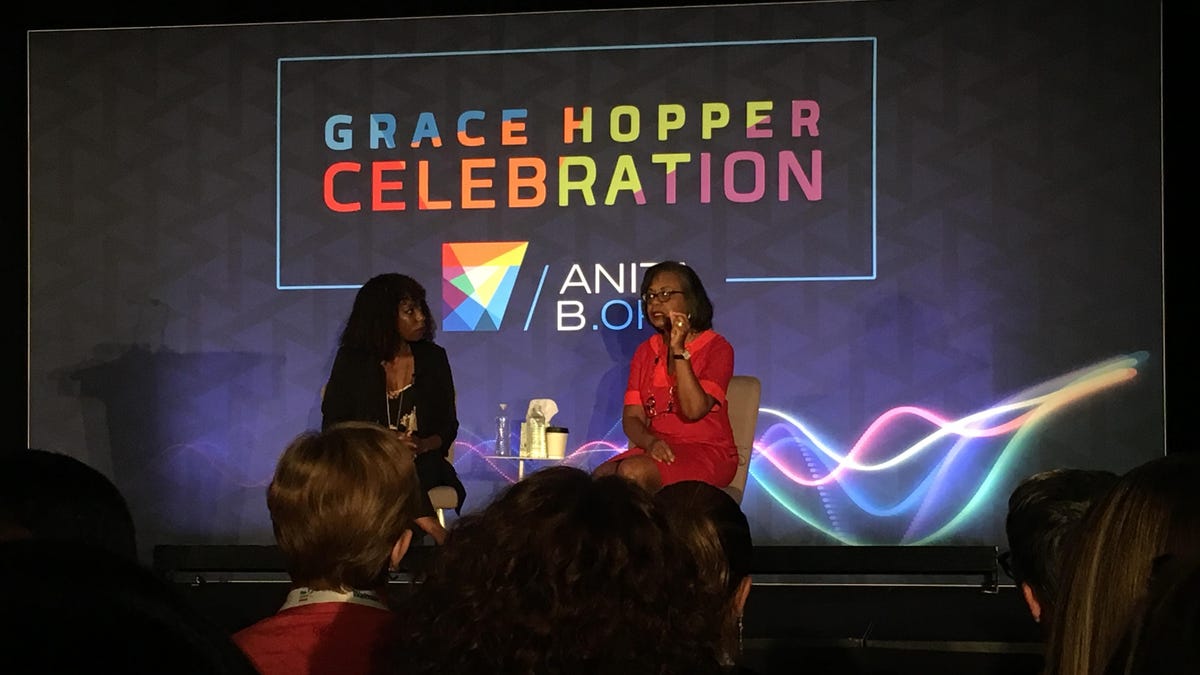As Senate mulls Kavanaugh pick, Anita Hill talks value of women's voices
At a timely moment, Hill speaks to a crowd at the Grace Hopper Celebration about changing workplace culture.

Anita Hill, right, at the Grace Hopper Celebration.
When asked the question: "What would you say to a woman who feels her voice doesn't matter?" Anita Hill simply responded, "It does."
Hill spoke Friday at the Grace Hopper Celebration, a conference focusing on women in tech that aims to rally women in an industry that grapples with gender and diversity inequality, and that's seen its share of accusations of workplace sexual harassment.
In a session moderated by Y-Vonne Hutchinson, founder of diversity-focused consulting firm ReadySet, Hill spoke about the need to bring cultural change, particularly to the workplace. She outlined a struggle between those in power holding on to traditional structures, procedures and traditions versus placing value on people's authentic experiences.
"We are still expected to represent in our work a tradition that doesn't necessarily reflect who we are," she said.
Hill is a professor of Social Policy, Law, and Women's Gender and Sexuality Studies at Brandeis University in Waltham, Massachusetts. You might be most familiar with her name, though, as the woman who testified before the Senate Judiciary Committee in 1991 that now-Supreme Court Justice Clarence Thomas sexually harassed her.
Her talk at GHC came just a day after the Senate Judiciary Committee heard testimony from Christine Blasey Ford, a woman who accused Supreme Court nominee Brett Kavanaugh of sexually assaulting her when they were in high school. Kavanaugh denies the allegations. And as Hill was about to come out on stage, the committee was determining how to move forward with Kavanaugh's confirmation.
Nearly 30 years later, Hill's talk could hardly have been more timely.
The Kavanaugh hearing was an impossible topic to ignore. When Hill said she would be surprised if the judge didn't get confirmed, an unsettled murmur rippled through the room.
She said his confirmation "will impact the work of diversity and inclusion that all of us are doing," including in "the fabric of workplaces today."
However, she said, even if the highest levels of our country don't prioritize the human experience of women like Ford (referencing the Senate bringing Kavanaugh's confirmation to a vote versus taking more time to investigate), we, as leaders and members of the workforce, can.
In tech, accounts of women like former Uber engineer Susan Fowler have brought to light workplace cultures that are often hostile toward women. Prominent venture capitalists like Dave McClure and Chris Sacca were named by The New York Times for accusations of harassment. In roughly the last year, the #MeToo movement has spurred women to speak out against their harassers, prompting the toppling of prominent figures from politics to entertainment.
Hill reminded the crowd of the power of each individual's actions and encouraged the audience to share their stories, talk to their kids, find coalitions and allies at work and most of all, not to give up.
"The work that we are doing to make a more inclusive society, a more inclusive workforce -- it's an honor to be involved in. It is worthy of all of our talents and all of our energy," Hill said.
Solving for XX: The tech industry seeks to overcome outdated ideas about "women in tech."
CNET Magazine: Check out a sample of the stories in CNET's newsstand edition.

